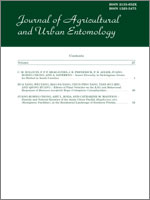Spotted wing drosophila (Drosophila suzukii Matsumura; Diptera: Drosophilidae) is a recently established invasive insect pest of berries and stone fruits. We tested the susceptibility of adult D. suzukii to infection by four species of entomopathogenic fungi: Beauveria bassiana (Bals.) Vuill., strains GHA and HF-23; Isaria fumosorosea Wize, strains FE-9901 and Apopka 97; Metarhizium anisopliae var anisopliae (Metschn.), strain F-52; and Metarhizium robertsii, strain DW-346; in laboratory bioassays. Scanning electron micrographs confirmed germination of conidia on D. suzukii integument. Exposure to conidia of all fungal isolates significantly increased mortality rates in comparison to untreated flies. In a subsequent bioassay of the two most virulent isolates, increasing pathogen dose from 0–16,000 conidia mm−2 of B. bassiana strain GHA increased fly mortality and proportion of sporulating cadavers. While fly inoculations with M. anisopliae at 0–4000 conidia mm−2 did not yield any measurable mortality response, a positive correlation was observed between dose and frequency of sporulating cadavers. In addition, we found that oocyte maturation rates were curtailed through one week of adulthood development after sub-lethal exposure to B. bassiana conidia. Despite promising laboratory results, a field cage experiment demonstrated that application of B. bassiana did not protect fruit from infestation. Taken together, these results show that entomopathogenic fungi are virulent against D. suzukii in the laboratory, but application in the field did not show promise.
How to translate text using browser tools
1 January 2017
Laboratory and Field Susceptibility of Drosophila suzukii Matsumura (Diptera: Drosophilidae) to Entomopathogenic Fungal Mycoses
Gabriel Alnajjar,
Francis A. Drummond,
Eleanor Groden
ACCESS THE FULL ARTICLE
It is not available for individual sale.
This article is only available to subscribers.
It is not available for individual sale.
It is not available for individual sale.
biocontrol
blueberry
Diptera
Drosophilidae
spotted wing drosophila





